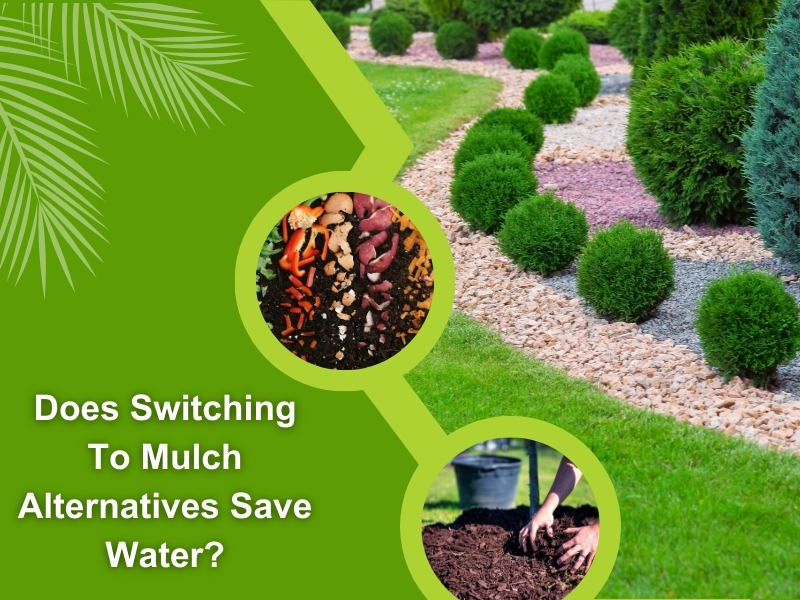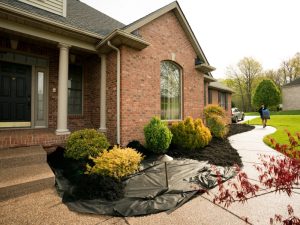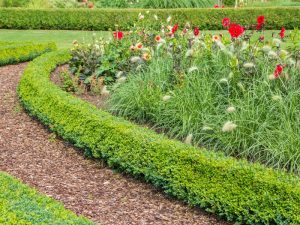Mulch is a Sydney gardener’s best friend. It suppresses weeds, regulates soil temperature, and helps retain precious moisture in hot, dry summers. But what if you’re looking for a change or traditional mulch isn’t readily available? Fear not! Several mulch alternatives can keep your garden thriving while potentially saving you water.
What are mulch alternatives?
Mulch alternatives are any materials you can use to cover the soil surface, mimicking the benefits of traditional mulch like bark chips or wood shavings. Here are some popular options:
- Living mulch (ground covers): Low-growing plants like creeping thyme, clover, or dichondra can suppress weeds and retain moisture, adding beauty to your garden.
- Gravel & rocks: Gravel and pebbles may not retain moisture as well as organic materials, but they can add a decorative touch and help control weeds. In sunny areas, choose lighter-coloured stones to reflect heat away from the soil.
- Compost: A double win! Compost adds nutrients to the soil as it breaks down while also helping retain moisture. Just be aware that it decomposes faster than traditional mulch and may need more frequent topping up.
- Newspaper (cardboard): To smother weeds, lay down several layers of damp newspaper (Cardboard works, too). Cover it with a thin layer of organic material like leaves or straw for aesthetics and to prevent the newspaper from blowing away. Remember to remove the plastic sleeves from newspapers before using them.
Using these mulch materials and implementing water saving practices, you can create a healthier, more sustainable garden that requires less maintenance.
Are mulch alternatives a good substitute for traditional mulch?
The effectiveness of mulch depends on the specific option you choose. Discover mulch alternatives that can help you conserve water while maintaining a beautiful garden. Living mulches are excellent at weed suppression and moisture retention but might require more maintenance, like trimming. Gravel allows for good drainage but doesn’t retain moisture as well. Newspapers are a budget-friendly option for weed control, but they need to be replaced more frequently.
How to choose a suitable mulch alternative for your garden?
The perfect alternative depends on your specific needs and garden style. Here are some factors to consider:
- Climate: For Sydney’s hot summers, prioritise water retention. Living mulch, compost, and (to a lesser extent) straw are good choices.
- Aesthetics: Living mulch adds a vibrant touch, while gravel and rocks offer a modern look. Consider your desired garden style.
- Maintenance: Living mulch requires occasional mowing, while gravel and rocks are low-maintenance. Compost needs frequent top-ups.
- Cost: Newspaper and cardboard are budget-friendly, while gravel and some living mulches can be more expensive.
Are there any drawbacks to using mulch alternatives?
While mulch alternatives offer benefits, some drawbacks exist:
- Living mulch: Requires more maintenance than traditional mulch. It may only be suitable for some plants.
- Gravel and rocks: It can get hot in summer, potentially damaging shallow-rooted plants.
- Compost: Attracts pests like slugs and snails. It breaks down quickly, requiring frequent top-ups.
- Newspapers and cardboard: They can become unsightly and soggy over time and may only be aesthetically pleasing in some gardens.
- Straw: May attract rodents. It can blow away easily, requiring reapplication.
How can you maximise water savings with mulch alternatives?
Even with alternatives, water conservation is critical. Here are some tips:
- Combine options: Layer newspaper or Cardboard under a more permanent material like gravel or living mulch.
- Water deeply and less frequently: Encourages roots to grow deeper, accessing more moisture.
- Group plants with similar water needs: This allows you to water efficiently.
- Consider water-saving irrigation systems: Drip irrigation delivers water directly to the roots, minimising evaporation. Additionally, organic mulch’s benefits for water retention make it a popular choice for gardeners.
- Mulch heavily: Apply a thick layer of your chosen alternative to maximise moisture retention.
Are there any environmental benefits to using mulch alternatives?
Absolutely! Switching to mulch alternatives can have a positive impact on the environment. Here’s a closer look:
- Biodiversity boost: Living mulches like creeping thyme or clover provide habitat for beneficial insects, pollinators, and small creatures, helping to maintain a healthy ecosystem in your garden.
- Erosion prevention: A mulch alternative’s dense, living cover helps to anchor the soil, preventing erosion caused by wind and rain. This is particularly important on slopes or in areas prone to heavy rainfall.
- Soil health improvement: Compost is a rich source of organic matter that improves soil structure, nutrient retention, and water-holding capacity. This leads to healthier plants and a more productive garden.
- Reduced reliance on chemicals: Using compost as a natural fertiliser can reduce your dependence on synthetic chemical fertilisers, which can harm the environment.
- Waste reduction: Repurposing recyclable materials like newspapers and
- Weed suppression: These materials act as temporary barriers, preventing weed seeds from germinating and establishing themselves. This can reduce the need for herbicides.
Is switching to mulch alternatives worth it?
Whether switching to mulch alternatives is worthwhile depends on your priorities. If conserving water is paramount, living mulch, compost, or a combination with gravel can be excellent choices. For those seeking low maintenance, gravel or rocks might be ideal.
Living mulch or compost are excellent options for those seeking a more natural and eco-friendly approach. Aesthetically, mulch adds colour and texture, while gravel and rocks offer a modern look.
Ultimately, using the best mulch for water conservation can contribute to a healthier environment and conserve precious water resources. The ideal choice depends on your needs, garden design, and financial constraints. Carefully evaluate the advantages and disadvantages of each option to select the best fit for your goals.
Ready to make a difference?
Take the first step towards a healthier, more water-efficient garden by choosing the suitable mulch alternative for your needs. Contact A1 Gardening & Landscaping Sydney Sydney today for expert advice and tailored solutions. Our team of professionals can help you:
- Select the perfect mulch alternative to suit your garden’s style and climate.
- Implement effective water-saving strategies to reduce your water bill.
- Create a beautiful and sustainable outdoor space that thrives in Sydney’s conditions.
Don’t wait any longer. Schedule a consultation and enjoy the benefits of a greener, healthier garden.



